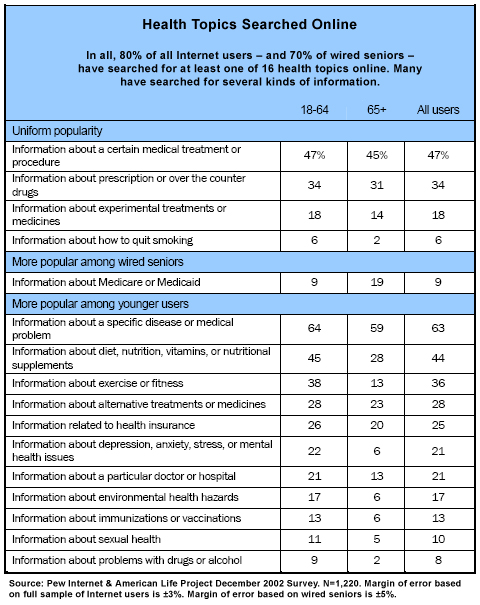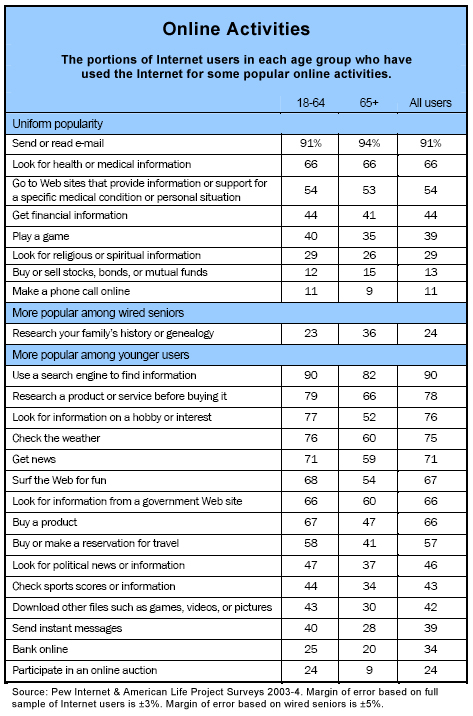Wired seniors want to keep up to date, whether that means emailing their children or staying current with the news.
Communication tops the agenda for wired seniors – but they generally stick to email.
As noted, email is equally popular among Internet users age 65 or older and their younger counterparts. Fully 94% of wired seniors have sent or received email. But fewer use instant messaging to keep in touch with friends and family – 28% of wired seniors have IM’d, compared to 39% of all Internet users. There is a small group of seniors on the cutting edge of communication technology, however. Nine percent of wired seniors have made a phone call online – compared to 11% of all users.
Wired seniors are avid information seekers.
Wired seniors are similar to the rest of the Internet population when it comes to information utilities. Eighty-two percent of wired seniors have used a search engine to find information online, compared to 90% of the general population of Internet users. Fifty-nine percent of wired seniors have gone online to get news, compared to 71% of all users. Thirty-seven percent of wired seniors look for news or information about politics and the campaign, compared to 46% of all users. In addition, 60% of wired seniors have looked for information on a government Web site, compared to 66% of all users.
Today’s wired seniors are much more interested in religious information than the seniors who had Internet access in 2000. Just 11% of wired seniors had looked for religious or spiritual material online in 2000. In the spring of 2003, 26% of wired seniors reported searching for this type of information online, compared to 29% of all Internet users.
Health information is popular among wired seniors.
Wired seniors are likely to describe their health as “fair” or “poor” and they are more likely than other age groups to be living with a disability or chronic illness.8 Sixty-six percent of wired seniors have looked for health or medical information online – the same percent as the general Internet population. However, this represents a more than 25% increase since 2000 in the number of online seniors who had performed health searches.
Fully 53% of wired seniors have gone to Web sites that provide information or support for a specific medical condition or personal situation, compared to 54% of the general Internet population.
When it comes to specific types of health information, both wired seniors and younger users are pretty equally interested in details about a specific disease, treatment, or drug. (See table on next page for more details.) Seniors and their loved ones would do well to keep up to date since a recent RAND Health study found that seniors got the recommended care for age-related conditions only one-third of the time.9
Wired seniors truly surpass younger users in pursuit of only one health-related topic: Medicare and Medicaid information. Indeed, the Center for Medicare Education recently issued a policy brief to help senior educators guide seniors through the thicket of new options.10
Why don’t online seniors seek health information on the Web? The main reason, according to their answers in our December 2002 survey, is that they are satisfied with the health and medical information they get elsewhere. Most did not fret about untrustworthy material online. Several said they didn’t have any health concerns at that point in their lives. And a few said it is because they would not know where to start looking online.

Wired seniors are doing more on the Internet, but they are still less likely than younger Internet users to try many online activities.
There have been big increases since 2000 in the number of online seniors doing several key activities on the Net. It is important to stress, though, that even with these high growth rates, it is usually the case that online seniors have done these online activities at lower rates that younger Internet users.
A rundown of the main activities we measure is on page 10 of this report. Here are some highlights of activities where there have been significant increases:
- 66% of wired seniors had done product research online by the end of 2003. That is an 18-point jump since 2000, and a growth rate of 38%.
- 47% of online seniors had bought something on the Internet by the end of 2003. That is an 11-point increase since 2000 and a growth rate of 31%.
- 41% have made travel reservations online by the end of 2003. That is a 16-point increase since 2000 and a growth rate of 64%.
- 60% of wired seniors had visited government Web sites by the end of 2003. That is a 20-point jump since 2000, and a growth rate of 50%.
- 26% of wired seniors had looked for religious and spiritual information by the end of 2003. That is a 15-point jump since 2000, or a growth rate of 136%.
- 20% of online seniors had done banking on the Internet by the end of 2003. That is a 12-point increase since 2000 and a growth rate of 150%.
It is important to stress that there is a double-edged quality to several of these figures. While there has been notable growth, it is still the case that seniors who use the Internet are less likely than younger Americans to do transactions online. One example: 66% of Internet users age 65 and older have looked up a product online, compared to 78% of all users. That gap is repeated when it comes to buying things online. While 47% of wired seniors have bought a product online, such as books, music, toys, or clothing, 66% of all Internet users have done so. Forty-one percent of wired seniors have made a reservation for travel or bought tickets online, compared to 57% of all users. Twenty percent of wired seniors have done their banking online, compared to 34% of all users. And just 9% of wired seniors have participated in an online auction, compared to 24% of all users.
Russell E. Morgan, president of the SPRY (Setting Priorities for Retirement Years) Foundation,11 says, “Seniors are more suspicious. They hear about identity fraud and credit card theft online and think, ‘Why take the chance?’” However, Morgan points out that transportation and managing one’s own finances are the two issues that worry seniors most. He adds, “The more seniors can track their finances, the less likely they will get into trouble later on.”
Wired seniors are essentially equal to younger users when it comes to researching financial information, such as stock quotes or mortgage interest rates. Forty-one percent of wired seniors have done this type of research, compared to 44% of all users. Fifteen percent of wired seniors buy or sell stocks, mutual funds, or bonds online, compared to 13% of the general Internet population. These numbers have not changed significantly between 2000 and 2004 – wired seniors and younger users have maintained, but not increased, their interest in following the stock market online.
Thomas S. Tullis, senior vice president of human interface design at Fidelity Investments, observes that while seniors are increasingly willing to use the Web for financial research, they are still more conservative than younger users when it comes to making trades.
Games, hobbies, and other diversions attract a smaller group of wired seniors.
Pew Internet Project surveys consistently find that hobby information is among the most popular topics among Internet users – 76% of all users have done this type of search. But only 52% of wired seniors have searched for hobby information. Fifty-four percent of wired seniors have surfed the Web “just for fun,” compared to 67% of all Internet users.
Wired seniors are among the least likely groups to download music, video, or game files, but they are among the most likely to play a game online. Thirty-five percent of Internet users age 65 and older have played a game online, compared to 39% of all users.
There is one hobby activity that elders clearly dominate – 36% of wired seniors have researched their family’s history or genealogy, compared to 24% of all users.





